Hollywood, Your Plug-In Hybrid Electric Has Arrived
Business partners Henrik Fisker and Bernhard Koehler are visibly on edge. While they want to dedicate every ounce of their focus on this all-important launch of their first baby, the 2012 Fisker Karma, their attentions are being constantly pulled away from it by big conference calls regarding the money and logistics of launching the whole Fisker Automotive franchise. Are they really and truly answering a $95,900-$108,900 question with this bold effort that enough people are asking? It's clear they just want us to fall in love with their lux'd up plug-in extended-range electric sedan.
We've been helicoptered into the infield handling circuit at California Speedway in Fontana to have a brisk go at one of Fisker Automotive's first completed verification prototypes of the Karma, built by Valmet Automotive in Uusikaupunki, Finland. We are already assuming that the build quality and finish of all the pretty parts will be fine, as Valmet has learned a lot about these things while building cars for Porsche to strict Stuttgart standards. We also already know that the car is indeed pretty inside and out, albeit particular to some out there, seeing as Fisker has designed such lovely lady lumps as the Aston Martin DB9 and V8 Vantage, not to mention the BMW Z8 roadster.
Continue reading First Drive: 2012 Fisker Karma...
2012 Fisker Karma – Click above for high-res image gallery
Business partners Henrik Fisker and Bernhard Koehler are visibly on edge. While they want to dedicate every ounce of their focus on this all-important launch of their first baby, the 2012 Fisker Karma, their attentions are being constantly pulled away from it by big conference calls regarding the money and logistics of launching the whole Fisker Automotive franchise. Are they really and truly answering a $95,900-$108,900 question with this bold effort that enough people are asking? It's clear they just want us to fall in love with their lux'd up plug-in extended-range electric sedan.
We've been helicoptered into the infield handling circuit at California Speedway in Fontana to have a brisk go at one of Fisker Automotive's first completed verification prototypes of the Karma, built by Valmet Automotive in Uusikaupunki, Finland. We are already assuming that the build quality and finish of all the pretty parts will be fine, as Valmet has learned a lot about these things while building cars for Porsche to strict Stuttgart standards. We also already know that the car is indeed pretty inside and out, albeit particular to some out there, seeing as Fisker has designed such lovely lady lumps as the Aston Martin DB9 and V8 Vantage, not to mention the BMW Z8 roadster.
Continue reading First Drive: 2012 Fisker Karma...
Photos courtesy Fisker Automotive
Fisker Coachbuild started back in 2005 after both Henrik and COO Bernhard Koehler had had enough of slow project cycles at Ford's Orange County advanced design studio. But they liked the area's year-round weather and the plushness surrounding them, so they stayed put in the OC.
Coachbuild work all by itself was pretty boring, so the two set their active minds to building an entire car company instead. As the story goes, one day, Fisker saw materials showing an abandoned U.S. military project for special ops called "Aggressor," which was a high-performance stealth hybrid-electric vehicle built by Quantum Technologies Worldwide. Not long thereafter, Fisker Automotive was born when Quantum and Fisker hooked up in 2007. And then, as quickly as January 2008 at the Detroit Auto Show, we saw the Fisker Karma concept car.
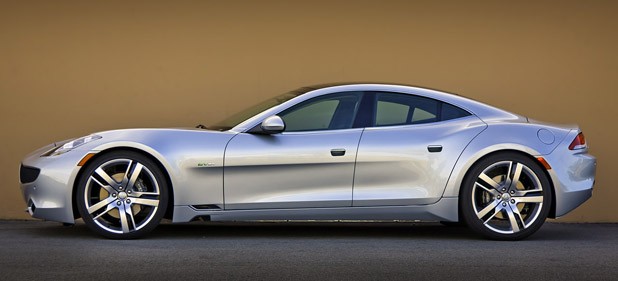
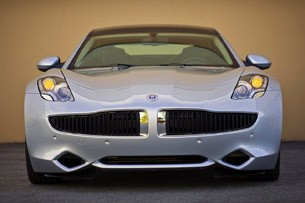
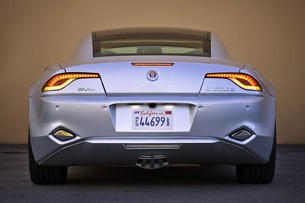
The Karma's initial reception was much warmer than luke, but the design frankly needed a little tweaking and most didn't give the Karma a serious chance at making any difference in our automotive lives. That was just before all of planet Earth became obsessed with greenery and eco and feeling badly about having destroyed nature to further our bipedal needs and desires. And then, of course, the world economy melted like a Dali clock and we all reassessed our capitalistic selfishness and whatnot. Basically, the timing was ideal for Fisker Automotive to try and cash in on the several innovative green and generally smart thoughts it was having. We, the guilty, are drawn to this stuff like yuppies to mesquite.
By late 2009, Fisker Automotive was coming out of essentially a nine-month hiatus during which Lucifer rose from Hell and swallowed mankind whole. Or so we thought. But investors finally felt like investing again, and just short of half a billion bucks had been promised to our heroes, much of this attracted by the imminent huge loan being talked about from the Department of Energy. Everything rode on that razor edge – not just for the Karma itself, but also for any future plans. That $529 million loan from you and me came through in September 2009 and Fisker Automotive went directly from vaporware to a $1 billion, fully-funded company with big cigar-chomping (but from sustainable tobacco farms) plans.
So, here we are in Fontana.
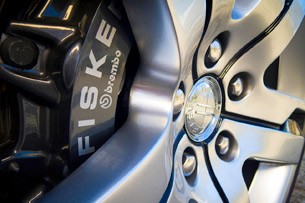
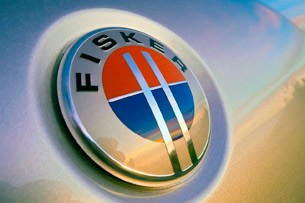
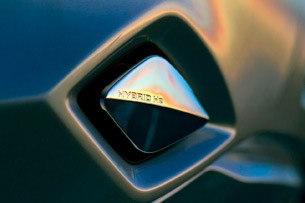
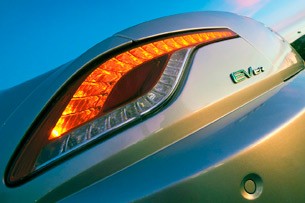
The first noteworthy item is that the design tweaks carried out after the January 2008 debut remain, and they still look good. These had to do mostly with the face and grille, which were not in keeping with the rest of the car's melody. We still don't care for the door handles that look to our eyes like something off a cute little Daihatsu – they're too small and size matters. But all the rest is fine and well within the developing Fisker DNA.
The whole package looks more showcar bodacious than the actual original concept.
You want wheelbase? By golly, we got some. 124.4 inches of some, to be precise. So, we have a Porsche Panamera- or Jaguar XF-length vehicle with the wheelbase of a 2012 long-wheelbase Jaguar XJ. This was needed primarily to fit all the plug-in EV with extended-range motor paraphernalia within the space between the two axles. Between the long-legged profile, wide tracks, and low 52.4-inch height, the Karma does look the business. Toss in standard 22-inch fair-weather wheels – called "Fisker Circuit Blade" for boldness points – and the whole package looks more showcar bodacious than the actual original concept. A rarity in this world.
When we suggested that maybe 20-inch Goodyear Eagle 1 tires and Fisker wheels might deliver more everyday comfort, rather than just scoffing at our practical ways, Fisker said, "If we went anywhere below 21 inches, the center part of the steering assembly would come dangerously close to the ground." We looked under there, and he's right. The winter tire set is 21 inches, by the way. As we look at the Karma, it hits us a bit like the Panamera in the sense that any wheel less than 21 inches starts to look perilously like 14-inch steelies on a Toyota Camry.
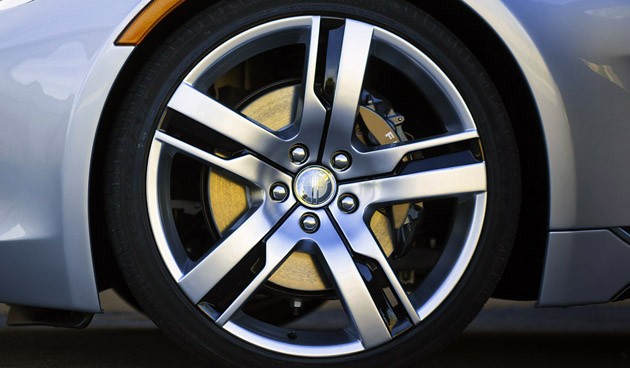
And we sit in it, press the brake pedal, and press the ignition button. Of course, seemingly nothing happens, but everything does light up nicely. Primary sight stealers are the driver instrument cluster and standard 10.2-inch haptic touchscreen of the Fisker Command Center onboard diagnostics/climate/entertainment/navigation unit created with Visteon.
The default mode is Stealth – in honor of the dropped special ops project Quantum was banking on (and sort of still is) through Fisker – and it can take us for a range of 50 miles on pure electric propulsion at speeds up to 95 mph. Acceleration to 60 mph can happen in this ninja-killer state in 7.9 seconds, which is not bad considering the Karma weighs just over two tons, not unlike a Panamera 4S. (Exact curb weight has not yet been revealed and, as any society lady knows, such questions are not to be asked if it can be helped.)
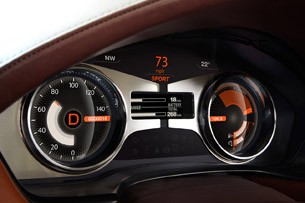
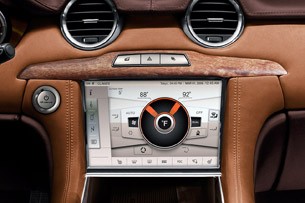
Stealth mode includes a soundtrack that's being called the "signature Fisker external sound," which all can hear up to 30 mph when it cuts out. The idea is that, for around-town driving, the car makes enough noise as it approaches so as to warn everyone in the vicinity who isn't also sitting in a car. It's an appropriate audio track, right from the semi-successful recent remake of Tron. It sounds more like an electric hovering sound with no internal-combustion simulation at all, which was unexpected and a pleasant surprise.
One basic driving fact about the Fisker Karma is that it is, at the very least, the first upper-premium four-door purely electrically driven car in this current electric tidal wave that we're living in. You could call it a plug-in electric and leave it at that, but, like the Chevrolet Volt, it's more interesting than that due to the range-extending engine. Unlike the Volt, however, the Karma is a pure series EV – the ICE up front does not in any way directly power the forward progress of the driven axle.
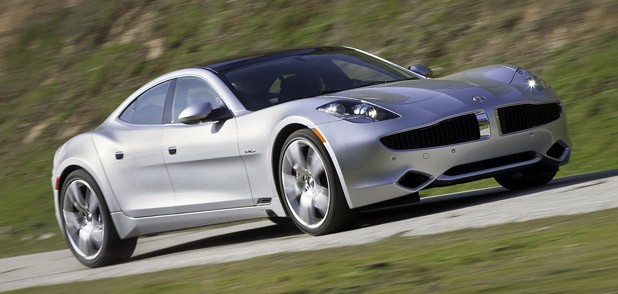
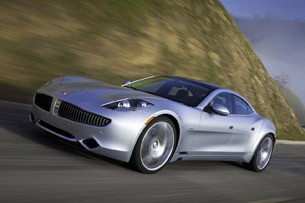
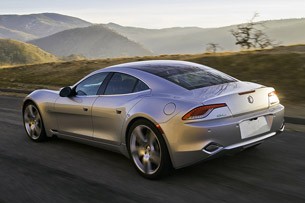
The 255-horsepower, 2.0-liter turbocharged and direct-injected GM Ecotec four-cylinder engine is cradled in a front mid-engine layout, and it powers the 175-kW generator while in Sport mode, which then pumps the 315-cell 606-pound lithium-ion battery pack full of kilowatt energy. It's the 20-kW battery pack that finally feeds the two 201-hp, electric motors placed fore and aft of the single-speed rear differential. Combined, the whole works is good for a stonking 981 pound-feet of torque. Thus spinneth the rear axle and hence the forward thrust. In this Sport or, may we suggest, extended-range mode, top speed is let out to 125 mph and acceleration to 60 mph now happens in just 5.9 seconds whether we like it or not. We'll come back to that.
Claimed maximum range in Sport mode is 300 miles. The fuel tank for the ER engine holds just 9.5 gallons, thus saving lots of sloshy pounds. Claimed possible autonomy per gallon in this longest range mode is 100+ miles, because you'll definitely be recharging the batteries two or three times overnight before you burn through all the liquid fuel. Fisker predicts "people will stay in Stealth mode for over 80 percent of the time they're driving." A noble forecast, O, Danish wise man.
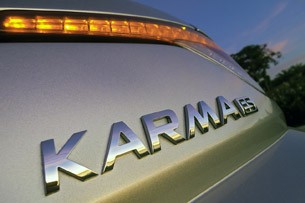
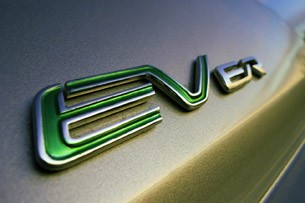
There we were, still in Pomona, yes, and we had polished off two spirited Stealth laps, grabbing the overly stylized steering wheel through several tight curves. We already were blown away by the dynamics of the all-new very stiff Karma chassis. Shall we risk a shower of disbelief from commentators by saying the Karma is the best handling large premium car in this entire segment? Why, yes, we shall. The steering itself could always be more communicative for us, but here it is still among the best of the biggies. The gaping wheelbase of the all-aluminum chassis and large wheels attached had us wondering however could this be, but it was so.
If there's a chink in the Karma's packaging, it's that luggage space totals just 7.1 cubic feet.
Suspension structure on all four corners is by forged aluminum double-wishbone, while front dampers are straightforward units and rear dampers are fancy self-leveling. This arrangement takes the consequent dynamics of the 47/53 fore/aft weight distribution to new heights. We were even shorting curves over the rumble strips and sliding the tail around slightly whenever needed. Certainly, the big Goodyear Eagle 1 tires helped a bunch – 255/35 WR22 (99W) front, 285/35 WR22 (102W) rear – as did the ironclad vented Brembo performance brakes that stopped us consistently all day. We were hauling butt and racing around in a battery-energized car and not complaining about the cornering dynamics! Ka-loo ka-lay, wake the entire village!
We really appreciated the interior as well throughout all of this action. Fisker is not immune to designing great premium sports car interiors, and he's done a winning job of the grand tourer variety here. The trim to get is the mid-range $103,900 EcoSport, as it includes all the base EcoStandard abundance plus Scottish hides all around (sourced from a self-sustaining establishment in the Scottish Highlands where cows roam freely and are fed well until they are slain and skinned). The final and top trim is the $108,900 EcoChic, which uses faux leathers of the best quality so you can have nothing on your conscious food-chain-wise. All woods seen are harvested from already fallen or sunken timbers in the upper Midwest and feel very nice. If there's a chink in the Karma's packaging, it's that luggage space totals just 7.1 cubic feet, meaning that despite the car's generous footprint, you'd better ring NetJet for longer trips.
We'll risk another pronouncement that leaves us open to thrown darts of criticism. As good as Audi's MMI and BMW's latest iDrive interfaces may be, they have a real competitor in the first-generation Visteon-Fisker Command Center. The touchscreen is terrific work and handles its several clever menus and graphics intuitively and attractively. If it only gets better from here, Fisker may be in the onboard computer functionality and interface business before long.
Oh, but wait, there's one big, sad note to report besides the one about there being no right-hand-drive cars for people who still drive on the wrong side of the road (all 70-plus countries of you). It has to do with Sport mode as it is inserted with a pull of the left steering wheel shift paddle. If we are switching to Sport while at a stop or at low speeds prior to accelerating, it functions well enough. The Ecotec ignites and the cabin gets a pretty decent new atmosphere with bass and baritone notes, though the notes should still be lower so as to hide the fact that it's a four-cylinder mill at our feet.
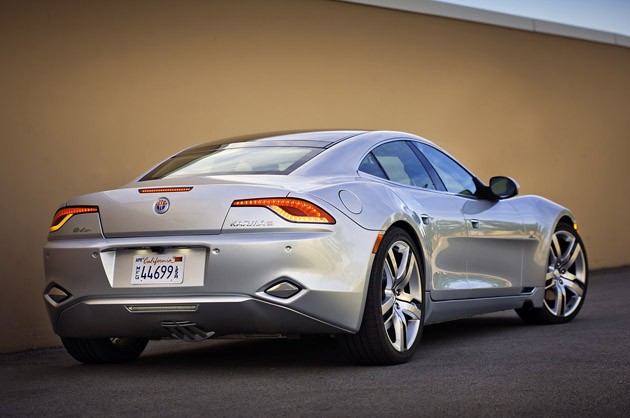
But then when we squish the throttle pedal to try and experience all the promised added oomph of Sport, the range-extending engine chimes in sonically wayyyyyy too much and with an unpleasant sound to boot. See, the exhaust pipes exit right at the back of the molded composite front fender panels mounted way down low, and there are the corresponding nicely designed heat extractors, too. This is aesthetically beautiful, to be sure, but functionally and packaging-wise, it's a real headache, quite literally. With the 6,300-rpm max revs of the 2.0T motor revving at will under throttle, the sound becomes completely uncharacteristic of a $100,000 four-door anything. This, friends, must be addressed. Fisker COO Koehler assured us that "we are aware of what you say and a new muffler has been ordered that should solve the issue." We hope so.
The bottom line is that the Fisker Karma is a rolling dream machine for anyone who wants something very different that works and drives exceptionally well for any company's first go at it all. If Fisker Automotive in SoCal and Valmet in Finland can just eliminate any hint of this anomalous Sport racket, the car can and should be an unqualified hit. There are 3,000-plus pre-orders of intent and deliveries are due to begin in late May of this year. Full-scale production of 1,500 units per month should be reached in October, they say, and in 2012, volume should already be at its 15,000/year maximum, a total comprised of three Karma body variants – the sedan, the convertible two-door Karma S, and a third model to be revealed at this September's Frankfurt Motor Show.
We love you, Fontana!
Photos courtesy Fisker Automotive
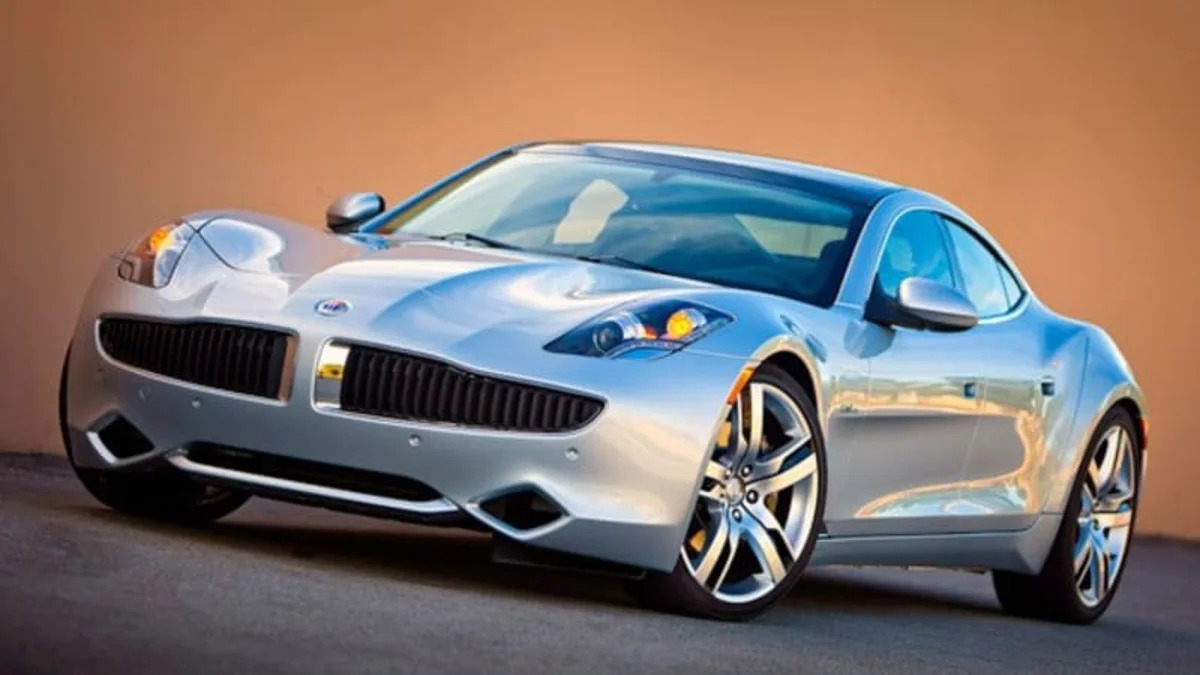
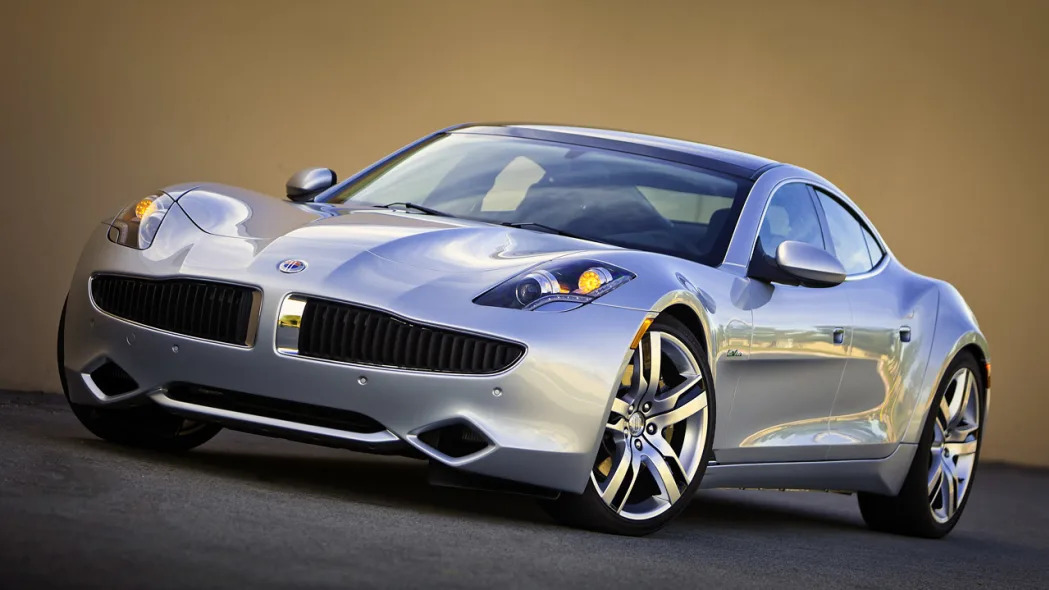
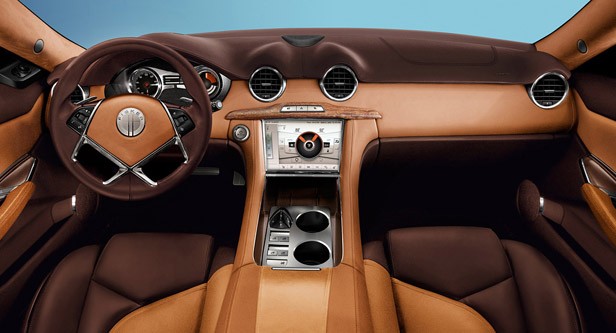
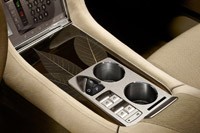
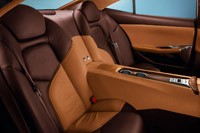
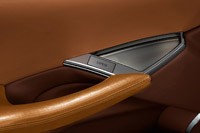

Sign in to post
Please sign in to leave a comment.
Continue